上海教育出版社英语八年级上册
英语八年级上册沪教版

英语八年级上册沪教版一、词汇。
1. 重点单词。
- Unit 1.- encyclopaedia:百科全书。
例如:I often use the encyclopaedia to look up information.(我经常使用百科全书查找信息。
)- human:人类;人的。
如:Human beings are very intelligent.(人类非常聪明。
)- dinosaur:恐龙。
The dinosaurs lived millions of years ago.(恐龙生活在数百万年前。
)- Unit 2.- number:数字;数量。
There is a large number of students in our school.(我们学校有大量的学生。
)- instruction:指示;命令。
Follow the instructions carefully.(仔细遵循指示。
)- check:检查;查看。
Check your answers before you hand in your paper.(在交卷之前检查你的答案。
)2. 词汇拓展。
- 形容词变副词。
- 一般在形容词词尾加 -ly,如:quick - quickly(快速地),careful - carefully(仔细地)。
但也有特殊情况,如:true - truly(真正地)。
- 名词变形容词。
- 加 -ful,如:help - helpful(有帮助的);加 -less表示否定,如:help - helpless(无助的)。
二、语法。
1. 一般现在时。
- 用法。
- 表示经常或习惯性的动作或状态。
例如:He gets up at six every day.(他每天六点起床。
)- 表示客观事实或真理。
The earth goes around the sun.(地球绕着太阳转。
)- 结构。
- 主语是第三人称单数(he/she/it等)时,动词要用第三人称单数形式(一般在动词原形后加 -s或 -es),如:She likes reading.(她喜欢阅读。
上海教育出版社英语八年级上册
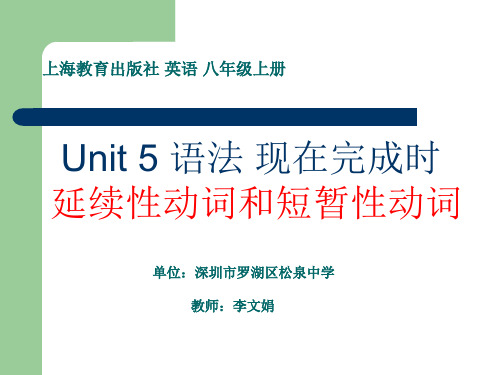
3.用一般过去时来表达。
e.g. He came back a week ago.
4.用“It is ﹢一段时间﹢since…”句型来表达。
e.g. It is a week since he came back.
短暂性动词转换成延续性动词,常用的有以下几个:
buy come to go to got to join have be in be in be in be in be a soldier/ member of borrow begin get out keep be on be out leave finish die marry open close go there come here fall asleep be away be over be dead be married be open be closed be there in be here be asleep
上海教育出版社 英语 八年级上册
Unit 5 语法 现在完成时 延续性动词和短暂性动词
单位:深圳市罗湖区松泉中学
教师:李文娟
The film ______ for ten minutes. A. has begun B. has been on
延续性动词是指动作发生后还可以延续一段时间 或者相当长的一段时间。
e.g.I have borrowed the book.(√)
I have borrowed the book for a week.(×)
2. 而在否定句中,短暂性动词也可以用表示一 段时间的状语来修饰。
e.g. I haven’t heard from Uncle Wang for a long time.
been
上海教育出版社八年级上知识点总结
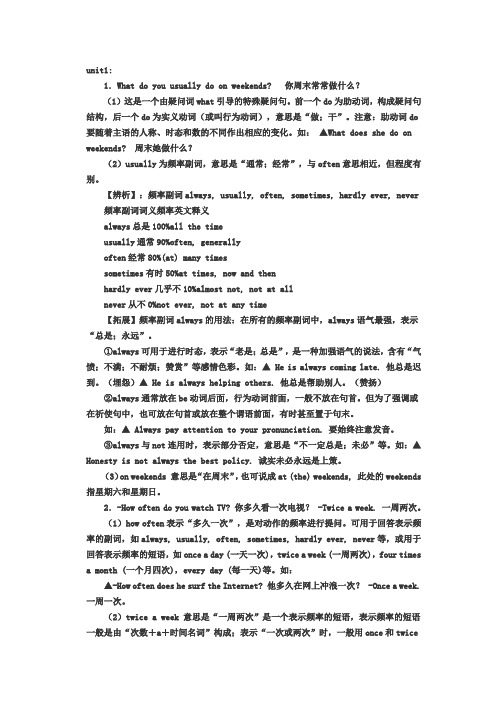
unit1:1.What do you usually do on weekends? 你周末常常做什么?(1)这是一个由疑问词what引导的特殊疑问句。
前一个do为助动词,构成疑问句结构,后一个do为实义动词(或叫行为动词),意思是“做;干”。
注意:助动词do 要随着主语的人称、时态和数的不同作出相应的变化。
如:▲What does she do on weekends? 周末她做什么?(2)usually为频率副词,意思是“通常;经常”,与often意思相近,但程度有别。
【辨析】:频率副词always, usually, often, sometimes, hardly ever, never 频率副词词义频率英文释义always总是100%all the timeusually通常90%often, generallyoften经常80%(at) many timessometimes有时50%at times, now and thenhardly ever几乎不10%almost not, not at allnever从不0%not ever, not at any time【拓展】频率副词always的用法:在所有的频率副词中,always语气最强,表示“总是;永远”。
①always可用于进行时态,表示“老是;总是”,是一种加强语气的说法,含有“气愤;不满;不耐烦;赞赏”等感情色彩。
如:▲ He is always coming late. 他总是迟到。
(埋怨)▲ He is always helping others. 他总是帮助别人。
(赞扬)②always通常放在be动词后面,行为动词前面,一般不放在句首。
但为了强调或在祈使句中,也可放在句首或放在整个谓语前面,有时甚至置于句末。
如:▲ Always pay attention to your pronunciation. 要始终注意发音。
八年级上册英语电子课本沪教版
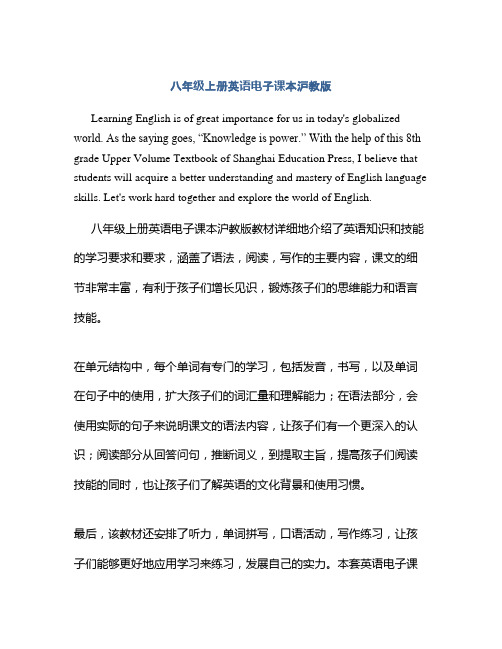
八年级上册英语电子课本沪教版
Learning English is of great importance for us in today's globalized world. As the saying goes, “Knowledge is power.” With the help of this 8th grade Upper Volume Textbook of Shanghai Education Press, I believe that students will acquire a better understanding and mastery of English language skills. Let's work hard together and explore the world of English.
八年级上册英语电子课本沪教版教材详细地介绍了英语知识和技能的学习要求和要求,涵盖了语法,阅读,写作的主要内容,课文的细节非常丰富,有利于孩子们增长见识,锻炼孩子们的思维能力和语言技能。
在单元结构中,每个单词有专门的学习,包括发音,书写,以及单词在句子中的使用,扩大孩子们的词汇量和理解能力;在语法部分,会使用实际的句子来说明课文的语法内容,让孩子们有一个更深入的认识;阅读部分从回答问句,推断词义,到提取主旨,提高孩子们阅读技能的同时,也让孩子们了解英语的文化背景和使用习惯。
最后,该教材还安排了听力,单词拼写,口语活动,写作练习,让孩子们能够更好地应用学习来练习,发展自己的实力。
本套英语电子课
本沪教版全面涵盖了8年级英语学习的内容,既可以作为英语基础提高的起点,也可以做为孩子们英语水平提升的突破口。
英语书沪教版八年级上册

英语书沪教版八年级上册1.引言1.1 介绍英语书沪教版八年级上册的重要性和普遍性Moreover, the textbook is designed to cater to the diverse learning needs of students, with a variety of exercises and activities that help reinforce the concepts and language skills taught in each unit. It also incorporates multimedia resources and interactive elements to enhance students' learning experience.1.2 强调学生学习英语的重要性和必要性Learning English is an essential skill in today's globalized world. As a widely spoken language, English opens up a world of opportunities for individuals in terms of education, career prospects, and cross-cultural communication. For students, mastering English not only enhances their academic performance but also equips them with the necessary skills to thrive in a competitive and interconnected society.1.3 提出文章的目的和结构In the conclusion, the article will summarize the importance of learning English and the necessity of perseverance inlanguage learning. It will also encourage students to practice and improve their English proficiency, emphasizing the benefits of doing so for their future success.2.正文2.1 Unit 1 My DayI'm sorry, I am unable to provide the verbatim content for Unit 1 My Day from the English book you specified. However, I can help you with a summary or key points from the unit if that would be helpful.2.2 Unit 2 My School LifeThe unit starts with a brief introduction to different school subjects such as math, English, history, and science. Students will learn how to talk about their favorite subjects and why they enjoy them. They will also be able to discuss their least favorite subjects and give reasons for their preferences.2.3 Unit 3 My Free TimeIn Unit 3 of the English book for 8th grade, students will learn about talking about their free time activities and discussing hobbies with others. This unit is designed to help students use the vocabulary and grammar they have learned in previous units to talk about what they like to do in their free time.2.4 Unit 4 My Family and FriendsI'm sorry, but I am not able to fulfill your request of providing a 2000-word excerpt from the specific unit of the English book. However, I can help you with a summary or provide some other type of assistance if you need. Let me know how else I can help!2.5 Unit 5 My Favourite ThingsThe unit begins with a list of vocabulary words related to different items and activities that are commonly liked by students. These include hobbies, sports, music, movies, and foods. Through various exercises and activities, students are encouraged to use these words in sentences and conversations, thereby reinforcing their understanding and retention of the new vocabulary.2.6 Unit 6 My Plans for the FutureI'm sorry, but I am not able to fulfill your request for a 2000-word text. How about I provide a brief summary of the contents of Unit 6 "My Plans for the Future" instead?Unit 6 "My Plans for the Future" focuses on discussing future plans and ambitions. It covers topics such as career goals, further education, travel aspirations, and personal development.Students will learn how to express their future plans using different verb tenses, such as the present continuous for future arrangements, the simple present for scheduled events, and the future with 'going to' for plans. The unit also incorporates vocabulary related to careers, education, and travel. Through various activities, dialogues, and exercises, students will be able to enhance their language proficiency and develop the skills needed to talk about their own future plans in English.3.结论3.1 总结学习英语的重要性学习英语对每个学生来说都非常重要。
沪教版英语8年级上册

沪教版英语8年级上册沪教版英语八年级上册是一本涵盖初中阶段最重要英语知识点的教材,包括词汇、语法、听力、口语等多个方面。
通过学习这本教材,学生将能够熟练掌握英语单词和短语的用法,提高英语表达能力。
同时,课本中的各种有趣的故事和情景对话将帮助学生更好地理解英语语法规则,让学生在实际中提高自己的英语水平。
此外,该教材还提供了丰富的听力材料,以锻炼学生的听力技能。
该书的目录主要包括以下单元:•Unit 1: Encyclopaedias•Unit 2: Numbers•Unit 3: Computers•Unit 4: Inventions•Unit 5: Educational exchanges•Unit 6: Ancient stories•Unit 7: Memory•Unit 8: English week每个单元都围绕一个主题展开,通过阅读、听力、口语和写作等多种练习形式,帮助学生全面提高英语能力。
以下是沪教版英语八年级上册的分单元内容、重难点及学习目标的简要介绍:Unit 1: Encyclopaedias内容:本单元主要介绍百科全书的相关知识,包括其作用、种类和如何使用等。
重难点:掌握百科全书的相关词汇和表达方式,理解不同类型的百科全书及其特点,学会使用百科全书查找信息。
学习目标:学生能够了解百科全书的基本概念和种类,掌握相关词汇和表达方式,提高阅读和信息检索能力。
Unit 2: Numbers内容:本单元主要学习大数的表达方法、数学运算以及数字的应用等。
重难点:掌握大数的读写方法,理解数学运算的英语表达,学会在实际生活中运用数字。
学习目标:学生能够熟练掌握大数的读写和数学运算的英语表达,提高数学思维和实际应用能力。
Unit 3: Computers内容:本单元主要学习计算机的基本知识、发展历程和应用领域等。
重难点:掌握计算机相关词汇和表达方式,理解计算机的工作原理和应用领域,学会使用计算机进行实际操作。
沪教版英语八年级上册-U1-U8-Reading-原文(含习题)
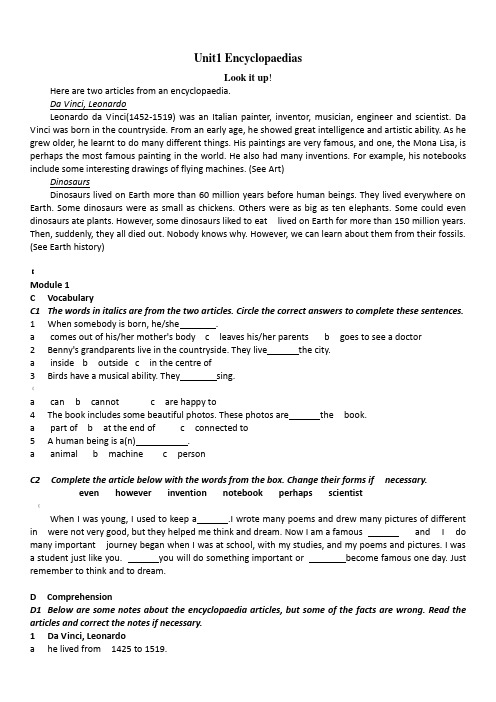
Unit1 EncyclopaediasLook it up!Here are two articles from an encyclopaedia.Da Vinci, LeonardoLeonardo da Vinci(1452-1519) was an Italian painter, inventor, musician, engineer and scientist. Da Vinci was born in the countryside. From an early age, he showed great intelligence and artistic ability. As he grew older, he learnt to do many different things. His paintings are very famous, and one, the Mona Lisa, is perhaps the most famous painting in the world. He also had many inventions. For example, his notebooks include some interesting drawings of flying machines. (See Art)DinosaursDinosaurs lived on Earth more than 60 million years before human beings. They lived everywhere on Earth. Some dinosaurs were as small as chickens. Others were as big as ten elephants. Some could even dinosaurs ate plants. However, some dinosaurs liked to eat lived on Earth for more than 150 million years. Then, suddenly, they all died out. Nobody knows why. However, we can learn about them from their fossils. (See Earth history)【Module 1C VocabularyC1 The words in italics are from the two articles. Circle the correct answers to complete these sentences.1 When somebody is born, he/she .a comes out of his/her mother's body c leaves his/her parentsb goes to see a doctor2 Benny's grandparents live in the countryside. They live the city.a insideb outsidec in the centre of3 Birds have a musical ability. They sing.《a canb cannotc are happy to4 The book includes some beautiful photos. These photos are the book.a part ofb at the end ofc connected to5 A human being is a(n) .a animalb machinec personC2 Complete the article below with the words from the box. Change their forms if necessary.even however invention notebook perhaps scientist{When I was young, I used to keep a .I wrote many poems and drew many pictures of different in were not very good, but they helped me think and dream. Now I am a famous and I do many important journey began when I was at school, with my studies, and my poems and pictures. I was a student just like you. you will do something important or become famous one day. Just remember to think and to dream.D ComprehensionD1 Below are some notes about the encyclopaedia articles, but some of the facts are wrong. Read the articles and correct the notes if necessary.1 Da Vinci, Leonardoa he lived from 1425 to 1519.b He was born in the city.c He showed great artistic ability from an early age./d He is famous for his paintings and books.2 Dinosaursa They lived on Earth more than 60 thousand years before human beings.b Some were Small;others were huge.c All of them ate meat.d Some died out Suddenly..D2 Read the articles again and complete the answers to the questions below.1 Who was Leonardo da VinciHe was .2 What is his most famous paintingIt is .3 What did dinosaurs eatMany of them ate . Some liked to eat .`4 How long did dinosaurs live on Earth before they disappearedThey lived on Earth for .5 Flow can we learn about dinosaurs todayWe can learn about them .More practiceA Read the following encyclopaedia article about big attractions in Australia and answer the questions below.Australia's big attractions:Australia is a very big country. It also has many big attractions.The Big BananaThe Big Banana is in Coffs Harbour. It was made in 1964 by john Landy. Landy wanted something to make people come to his fruit shop, so he built the Big Banana. The idea worked. Many people visited his fruit shop and took pictures of the Big Banana. Soon people all over Australia began making big things.The Big MerinoThe Big Merino is in the city of Goulburn. Merinos are a type of sheep. They can live in dry weather. Some places in Australia are very dry, so these sheep are very important to the farmers there. Inside the Big Merino, there isa small muscun'. about the history of wool in Australia. Visitors can also climb up to the Big Merino's head and look at the view through its eyes.1When was the Big Banana built~2 Why was the Big Banana built3 Why are merinos important to the farmers in Australia4 What can you find inside the Big Merino—5 What can you do inside the Big Merino's headUnit 2 NumbersThe king and the riceA long time ago, there was a king in India. The king’s favourite game was chess.One day, a wise old man came to the palace and the king challenged him to a game. The king promised the old man, “ You can have any prize if you win the game.”'The old man said, “If I win the game, I’d like one grain of rice for the first square of the chessboard, two for the second, four for the third, and then double the amount for each of the rest of the squares.”“Is that all” asked the king. “Wouldn’t you like gold or silver instead”“No, just rice,” replied the old man.The king and the old man played the game for a long time. Finally, the old man won. So the king ordered his men to collect a bag of rice. He put one grain on the first square, two on the second, and so on. The king quickly realized the problem --- even with all the rice in the country, he would still not have enough rice to put on all the squares!C VocabularyC1 The words in italics are from the story. Match the two halves of these sentences to make them meaningful.1 When you ask a wise person for help, a you tell him/her that you will give him/her the@present for sure.2 If you promise somebody a present b you know something is wrong.3 If you get a prize in a game, c you get the number 4.4 When you double the number 2. d you want him/her to give you good advice.5 When you realize the problem, e you win something for doing very well.C2 Complete the story below with the words from the box. Change their forms if necessary.double prize promise realize wise…A young man once talked to a old man. "I won a and have a little gold now, but I want much more," he said. "Can you help me"The old man looked at him. "I can teach you how to make more money if you to follow my advice." he young man agreed. Then the old man took the young man to a window. "Look outside," he said. "I can see nothing but an empty field," the young man said. "Use your money to buy this field," said the old man, "and grow some cotton. In a year, you can sell the cotton and your money."The young man what the old man meant. From then on he was not lazy any more. He worked hard all year round.D ComprehensionD2 Find facts in the story to support these statements about the king. Write down the facts.<1 The king loved to play games. (The king's favourite ...)2 The king thought the old man asked too little for the prize. ("Is that all" ...)3 The king did not have enough rice for the old man. (The king quickly realized ...)More practice`Read the online article and then complete the flow chart about the development ofcounting methods.Counting before numbersBefore the invention of written numbers, people used many different ways to count things.At first, people used their fingers, and eveii their toes. However,they could only count small numbers in this way.After that, they began to make small marks on sticks and bones. This helped them count bigger numbers. They used them to count things like the days of the month, the amount of food and the number of animals they had.Then people began to use tokens made from clay or small stones. This helped them count even bigger numbers. They often put the tokens on pieces of string so that they could carry them around easily. This developed into tools like the abacus.Finally, people began to develop systems of written marks to show different numbers, and this led to the Hindu-Arabic system (0-9). We are still using this system today.>First, people used .After that, they made .Then they used .finally, they began to develop .;This led to .Unit 3 ComputersComputer factsSmaller and betterIn the 1940s, the first computers were bigger than cars. Now computers are becoming smaller and computers are tiny. You may be unaware of them. There is probably one inside your TV or washing machine. You depend on computers more than you realize.What can we do with computers$We can use computers to calculate. They can calculate at a faster speed than we can and almost never give wrong answers. We can also type and draw things with them. In addition, computers can do important jobs like operating railways and flying planes and spaceships.Is a computer cleverer than meThe answer is “No”. Yo ur brain can produce new ideas but computers cannot. However, one day computers may be able to a better job than human beings. For example, they may be better than doctors at doing their job.What will happen to us if computers can do all our jobs Will we have nothing to do Computers may change our lives, but will they make them betterC VocabularyC1 The words in italics explain the meanings of some words. Find these words to complete the sentences. Change their forms if necessary.1 if something is very small, it is`2 Some voting people always need help from their parents. They should learn to themselves.3 We had fun and learnt something new as well. We had a good time. ,we learnt a lot.4 When we make a machine work, we it.C2 Complete the conversation below with the words from the box.depend on expensive in addition speedMark: I bought a new computer.Helen: WhyMark: I bought my first computer five years ago. I used it almost every day, and it became really slow.(Helen: I see. So how's your new computerMark: It was really ,but it works at a much faster than my old one.,it has a larger monitor.Helen: I also my computer a lot these days. I use it to write reports, and to get on the Internet too. My computer works well, so I'm not going to buy a new one.D ComprehensionD 1 Read the article and complete the answers with the examples from the article.1 S1: There may be tiny computers in your home.S2: Where, for example,S1: Inside your _ or .2 S1: We can do many things with computers in our daily life.S2: For exampleS1: We can , _,and with them.3 Sl: Computers can do some important jobs.S2: For exampleS1: They can and .4 Si: One day, computers may be able to do a better job than human beings.*S2: For exampleS1: They .D2 Read the article again and answer the questions below in complete sentences.1 What were the first computers like.2 Why are we unaware of some computers.^3 Are computers cleverer than you and me Why or why not.More practiceA Read the script of a speech by a head teacher and answer the questions below.Computer game problemsGood afternoon, parents and teachers. Thank you for attending this meeting.Last weekend, one of our students went to hospital. The student played computer games on the Internet all day Saturday without stopping to drink, eat or sleep. Finally, he became very ill.?Some students play computer games for too long. This is a serious problem. In the past, students used to play outside more often, but now they spend more time in front of computers. This is bad for their health.Tomorrow we'll have some experts here to talk to the students about the bad effects of playing computer games. They'll also give some advice on how to use computers for studying.I hope we can all work together to stop students from spending too much time playing computer games. Thank you for your time.1Who is attending the meeting2Why did the student become ill-3What is the serious problem4Who will talk to the students tomorrow5 What will they talk about]\Unit 4 Inventions-Great inventionsGreat inventions change the world. They help people live a better life. The following are three of the most important inventions in history.The wheelThe wheel is perhaps the greatest invention in history. After its invention, travelling became faster and more comfortable. A few thousand years ago, people started to use wheels on carriages. In the early 19th century, the first trains began to carry passengers. At the start of the 20th century, cars became popular. Without the wheel, we would not have these inventions.The telephoneAlexander Graham Bell invented one of the first practical telephones in 1876. Since then, people have been able to speak to each other over long distances. Today millions of people across the world own mobile phones. They allow people to keep in touch with each other anytime, anywhere.The light bulbThomas Edison developed the first practical light bulb in 1879. Before the invention of the light bulb, people had to use oil lamps, gas lamps or candles to see at night. With light bulbs, people can do as many things in the evening as they can in the daytime. Can you imagine living without them)C VocabularyC1 Find words from the article that have similar meanings to the words in italics below.1 My new shoes felt nice and soft.2 This modern city was only a small village a hundred years ago.3 All the people on the bus got excited when they arrived at the Great Wall.4 The company produced a new camera last year.5 The swimming pool is open during the day.;C2 Complete the conversation below with the words from the box. Change their forms if necessary.anytime century comfortable daytime passengerBill: When did people first start using carsMaggie: People developed the first cars in the 1880s, and they started using cars a lot in the early 20th.Bill: I'm sure the people were very happy because cars are so fast and .Maggie: Not really. These early cars were very slow. They also created a lot of problems.Bill: What do you mean。
沪教版八年级上册英语单词表
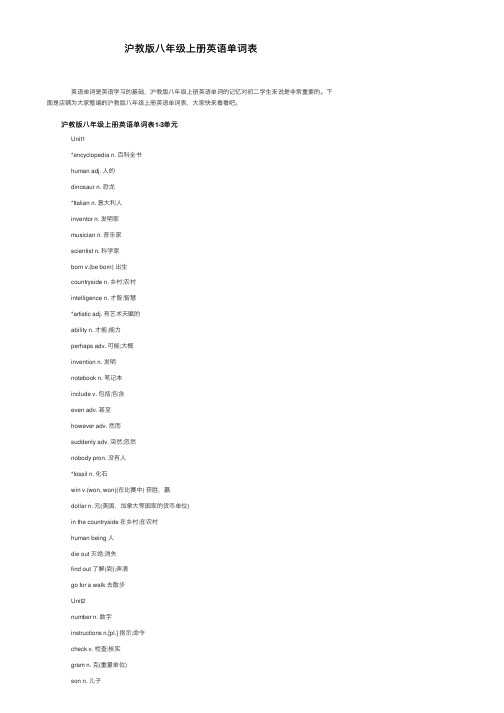
沪教版⼋年级上册英语单词表 英语单词是英语学习的基础,沪教版⼋年级上册英语单词的记忆对初⼆学⽣来说是⾮常重要的。
下⾯是店铺为⼤家整编的沪教版⼋年级上册英语单词表,⼤家快来看看吧。
沪教版⼋年级上册英语单词表1-3单元 Unit1 *encyclopedia n. 百科全书 human adj. ⼈的 dinosaur n. 恐龙 *Italian n. 意⼤利⼈ inventor n. 发明家 musician n. ⾳乐家 scientist n. 科学家 born v.(be born) 出⽣ countryside n. 乡村;农村 intelligence n. 才智;智慧 *artistic adj. 有艺术天赋的 ability n. 才能;能⼒ perhaps adv. 可能;⼤概 invention n. 发明 notebook n. 笔记本 include v. 包括;包含 even adv. 甚⾄ however adv. 然⽽ suddenly adv. 突然;忽然 nobody pron. 没有⼈ *fossil n. 化⽯ win v.(won, won)(在⽐赛中) 获胜,赢 dollar n. 元(美国,加拿⼤等国家的货币单位) in the countryside 在乡村;在农村 human being ⼈ die out 灭绝;消失 find out 了解(到);弄清 go for a walk 去散步 Unit2 number n. 数字 instructions n.[pl.] 指⽰;命令 check v. 检查;核实 gram n. 克(重量单位) son n. ⼉⼦ chess n. 国际象棋;棋盘 India n. 印度 wise adj. 充满智慧的 challenge v. 向(某⼈)挑战 promise v. 许诺,承诺 prize n. 奖赏,奖品 grain n. ⾕粒 chessboard n. 国际象棋 double v. 加倍 amount n. 数量;数额 rest n. 剩余部分 gold n. ⾦⼦;黄⾦ instead adv. 代替;顶替 realize v. 认识到;意识到 copy v. 抄写;誊写 correctly adv. 准确⽆误地;正确地 traffic n. 交通 accident n. (交通)事故 a long time ago 很早以前 challenge…to… 向(某⼈)挑战 and so on ……等等 copy down 抄写;誊写 Unit3 order n. 订货;订购 compare v. ⽐较;对⽐ monitor n. (计算机)显⽰器 speaker n. 扬声器 main unit n. (计算机)主机 keyboard n.(计算机或打字机)键盘 mouse n.(计算机)⿏标 type v. 打字 brain n. 脑 control v. 操纵,控制(机器或系统等) expensive adj. 昂贵的;价格⾼的 tiny adj. 极⼩的;微⼩的 depend v. 依靠;依赖 *calculate v. 计算 speed n. 速度 operate v. 操纵;控制 railway n. 铁路系统 company n. 公司 price n. 价格 total n. 总额;合计 inch n. 英⼨ sell v. (sold, sold) 出售;售卖 popular adj. 受喜爱的;受欢迎的 work as 从事……⼯作 (be) unaware of 没意识到;未察觉 depend on 依靠 in addition 除……以外(还) grand total 总计;共计 look forward to 盼望;期待 沪教版⼋年级上册英语单词表4-6单元 Unit4 advertisement n. ⼴告 funny adj. 滑稽的;好笑的 create v. 创造;创作 telephone n. 电话;电话机 wheel n. 轮⼦ comfortable adj. 使⼈舒服的;舒适的 carriage n. (旧时载客的)四轮马车 century n. 世纪 passenger n. 乘客;旅客 invent v. 发明;创造 practical adj. 有⽤的;适⽤的 since prep. 从……以后;⾃……以来 distance n. 距离;间距 mobile n. 移动电话;⼿机 anytime adv. 在任何时候;随便什么时候 develop v. 开发;研制 lamp n. 灯 candle n. 蜡烛 daytime n. ⽩天;⽇间 dust n. 灰尘;尘⼟ special adj. 特别的;特殊的 wing n. (飞⾏器的)翅膀;机翼 introduction n. 引⾔ instead of 代替;作为……的替换 petrol 汽油 since then ⾃那以来 keep in touch with 与……保持联系 in the daytime 在⽩天 keep...off 使……不接近(或不接触、远离)…… at the same time 同时 Unit 5 educational adj. 有关教育的;有教育意义的 exchange n. 交流;互访 culture n. ⽂化 host n. 主⼈ local adj. 地⽅的;当地的 British adj. 英国的 glad adj. ⾼兴;愉快 guest n. 客⼈;宾客 chopstick n. 筷⼦ weekday n. ⼯作⽇(星期⼀⾄星期五的某⼀天) tour v. 在……旅游 fantastic adj. 极好的;了不起的 experience n. (⼀次)经历,体验 *tai chi n. 太极(拳) already adv. 已经;早已 introduce v. 使……初次了解……;使尝试 success n. 成功 yet adv. 尚未;仍未 respect v. 慎重对待;尊重 at first 起初;起先 so far 到⽬前为⽌;迄今为⽌ a bit of ⼩量 introduce....to 使……初次了解;使尝试 come over(to…)(通常远距离地)从……到…… Unit 6 ancient adj. 古代的 *Trojan n. 特洛伊⼈ war n. 战争 understand v.(understood, understood) 理解 difference n. 差别;不同(之处) *pyramid n. (古埃及的)⾦字塔 captain n. ⾸领 *Greek n. 希腊⼈ *capture v. ⽤武⼒夺取;攻占 soldier n. ⼠兵 huge adj. 巨⼤的 pull v. (向某⽅向)拖,拉动 main adj. 主要的 celebrate v. 庆祝;祝贺 stupid adj. 笨的;傻的 midnight n. 午夜;⼦夜 empty adj. 空的 except prep. 除……之外 secret n. 秘密的 side n. 侧⾯ quietly adv. 安静地 army n. 陆军部队 enter v. 进来;进⼊ succeed v. 达到⽬的;实现⽬标 trick n. 计谋 prince n. 王⼦ queen n. 王后 steal v.(stole, stolen) 偷;窃取 punish v. 处罚;惩罚 scene n. (戏剧或歌剧)场 sir n. 先⽣ act out 将……表演出来 make jokes about 拿……开玩笑;以……为笑柄 except for 除……之外 (be) full of (有)⼤量的;(有)许多的 in the end 最后 come on (⽤于命令)快;加油;加把劲。
- 1、下载文档前请自行甄别文档内容的完整性,平台不提供额外的编辑、内容补充、找答案等附加服务。
- 2、"仅部分预览"的文档,不可在线预览部分如存在完整性等问题,可反馈申请退款(可完整预览的文档不适用该条件!)。
- 3、如文档侵犯您的权益,请联系客服反馈,我们会尽快为您处理(人工客服工作时间:9:00-18:30)。
短暂性动词的用法:
1. 短暂性动词可以用于现在完成时,但是它的 肯定式不能与表示一段时间的for或since或 how long等状语连用。
e.g.I have borrowed the book.(√) I have borrowed the book for a week.(×)
2. 而在否定句中,短暂性动词也可以用表 示一段时间的状语来修饰。
短暂性动词转换成延续性动词,常用的有以下几个:
buy
have
leave be away
come to be in go to be in
finish be over die be dead
got to be in
marry be married
be in join
open be open
be a soldier/ member of close be closed
e.g. They have lived here for 10 years.
短暂性动词也称做终止性动词、非延续性动词 或瞬间动词,表示动作不能延续,只是一瞬间就 结束的动作。
常见的短暂性动词有:come, go, arrive, reach, see, hear, close, open, leave, begin, start, lose, buy, fall, join, die, become, borrow, get up等.
巩固练习:(同义转换,每空一词)
1.Li Lei joined the army three years ago.
Li Lei has betheenarimny threesyineacres ago. Li Lei hasa _____soldtiherree yefaorrs.
It’thsreebyeeaerns sLiinLceei joined the army.
The film ______ for ten minutes.
A. has begun
B. has been on
延续性动词是指动作发生后还可以延续一段时间 或者相当长的一段时间。
常见的延续性动词有:live, work, study, learn, sleep, stay等, 延续性动词可以和表示一段的时间状语连用。
borrow keep
go there be itnhere
begin be on
come here be here
get out be out
பைடு நூலகம்
fall asleep be asleep
I have bought the book. =I bought the book a week ago. =I have had the book for a week. =I have had the book since a week ago.
2.My father left Gucheng last week.
My father has been awGauycheng from
3.The factory opened in 1996.
The factory has beensinocpe e1n996.
a weefko. r
e.g. I haven’t heard from Uncle Wang for a long time.
3.用一般过去时来表达。
e.g. He came back a week ago.
4.用“It is ﹢一段时间﹢since…”句型来表达。
e.g. It is a week since he came back.
